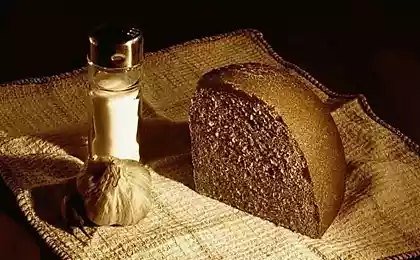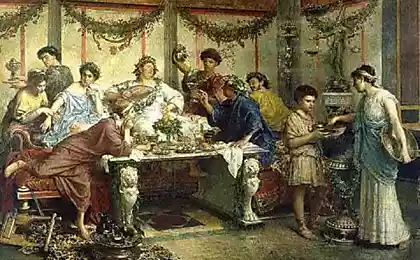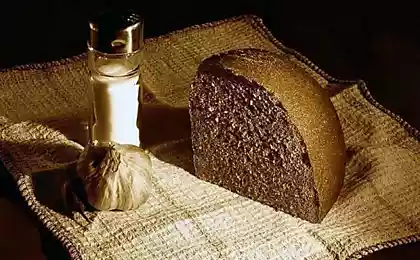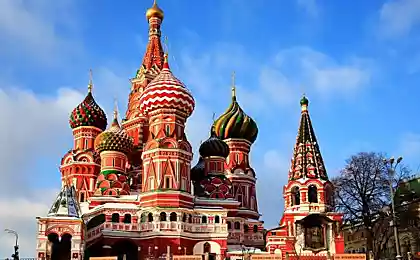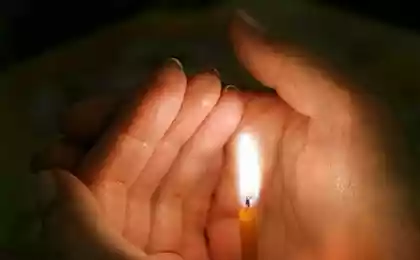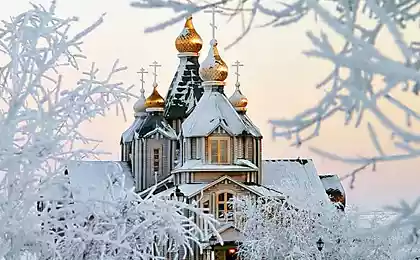737
Post the coffee and sympathetic
Hello!
We roast coffee.
You may be interested in reading about it, and I asked our roasters Kohl for you to write a post. The picture roster - a special stove for roasting coffee beans.
10 Photo © Daniilskiy
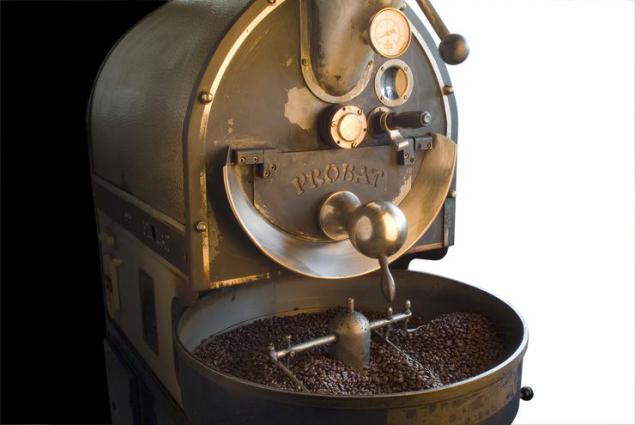
Green beans are very similar to Dried peas in banks. In all Soviet kitchens lying peas. He was kept in such podrzhavyh cans with characteristic curved cover, which is not immediately closed. Peas very, very hard, even foot not rastopchesh. And the smell had a distinctive, memorable. So say people who see green coffee for the first time: peas smell.
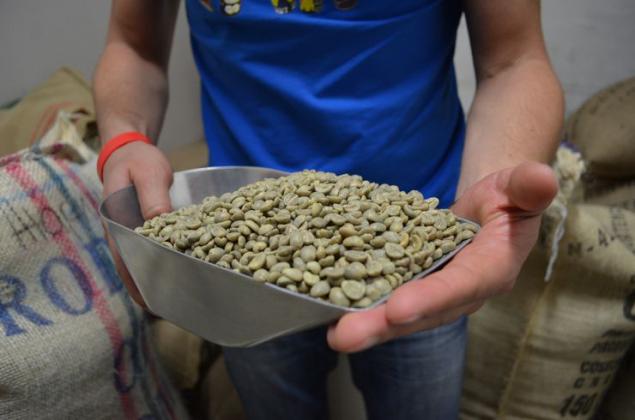
However, inquisitive nose detects a good coffee and other flavors. Sometimes rotten apples or yeast dough - is of the unexpected. And the average "prostokofe" smells really green peas. Yet it's beans.
Green coffee - coffee berry seed is extracted from numerous organic diapers: peel, pulp, parchment. Imagine a plum, which very little flesh, and it is very hard attached to the seed.
The peel is removed from the berries is quite simple. Press the fingers, she easily slips from the body of the berries. But to separate the bone from the pulp is very hard. More precisely, in principle, it is not difficult, if you spend one minute berry berries 3. But if a million, it's a difficult task, and it is engaged in the whole manufacturing industry. Quality and scruples processing in turn will greatly affect not only the taste, but also on the price of the product.
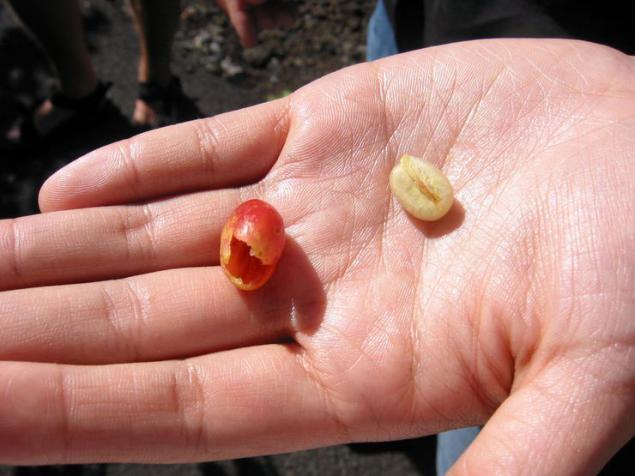
So the separation of grain, usually consisting of two halves and a coffee bean processing. There is an incredible amount of its subtleties, pens and fishechek.
Negros sorted coffee berry
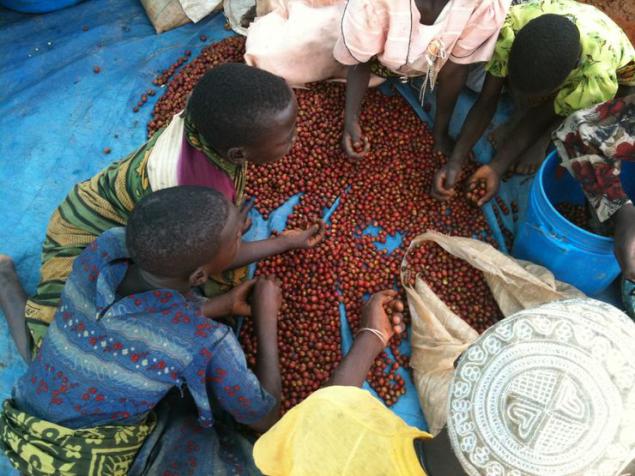
Once the coffee is collected and processed it should fry. Why roast coffee? In itself, the grain is very concentrated and strong. It is with great reluctance, and gives itself dissolves in water. So we need to weaken the ties inside the grain to the volatile aromatics started to go unchecked. We burn, thus weakening, most of these communications. And then the grain begins to reveal its pores are formed in cavitation, grain swells (increasing in volume almost doubled), bonds weaken and natural grain spirit begins to stand out strongly.
Grain can be compared with the long stored at the bottom of the box with a rubber ball. If it is not fully inflated, it will be wrinkled when it is inflated well, the surface becomes smooth.
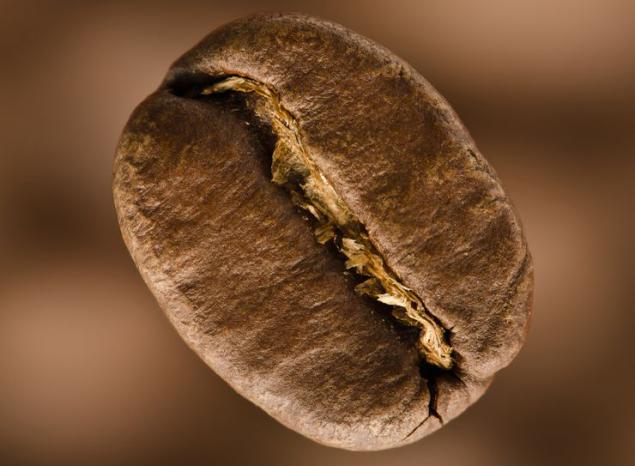
Let us turn to the most, in my opinion, interesting.
Generally coffee fry in a skillet in a small home roster, at the stake or laser pepyakoy from the future. Charlie would fry his eyes, but it is better suited for this special professional roasters.
Roster - a carefully thought-through, tested at the stands, stuffed engineer genius, very expensive, and for each individual roasters thing. He's a big, powerful, fire. But it's made for one purpose - to roast coffee. Uniformity, stability and usability are distinguished one from another roster. There are many manufacturers, but the best do in Germany and the USA: Probat, Giesen, Diedrich - the big three.
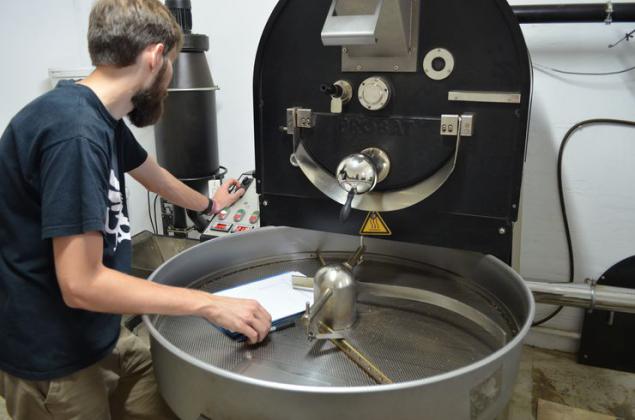
Just specify the roster - a machine, but sometimes "Roster" refers to the profession of this same unit. I, not to be confused, call the profession in Russian: roasters.
So even the most modern and futuristic car you need to drive, the plane still planted by hand and the other is not quite correct analogy. The process of roasting, anyway, will require human presence. Only a person determines the style and the stability of frying. Of course you can put the program and fry, relying on electronic brain roster (if it is), but it's cool if you drink this coffee will also be electronic consumers.
Profile roasting, for example:
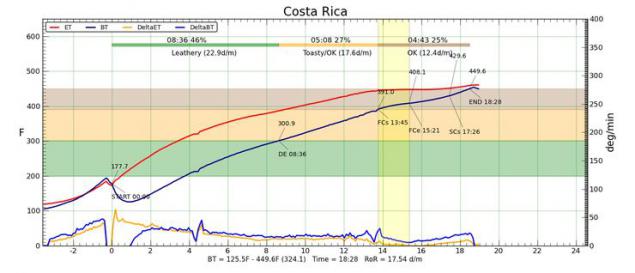
Briefly describe the process.
We stock kept green coffee. In a room with a predetermined humidity and temperature. Before frying, we warm up a roster so that uniformly warmed up (and expanded) bearings and moving parts. Roster is heated to a temperature of 235 C for 40-50 minutes (usually enough). Roster runs on natural gas. There are low-end models, run on electricity, but to achieve the desired effect in them is impossible. They are very inert.
Green coffee is poured into a drum roaster after reaching the temperature required for download. This usually 215-225 degrees Celsius. This temperature is determined empirically and depends on the style of roasting. The first 3-4 minutes of the process of drying the grain. From the coffee begins to evaporate the moisture. Roaster operates at peak power, the temperature sensor 89c falls to, and then slowly increase the dynamics of 15-17 C per minute. At some point in the 5-6 minute grain goes in the "yellow stage." Grains turn yellow, purchasing straw color. Most of the moisture evaporated, and begins to roast coffee. At this point, the temperature dynamics - 8-10S minute.
For 8-10 minutes comes the moment the so-called "first of crack." Gases and steam coming out of corn bursting with grain and it cracks, releasing the remains of a couple and begins to roast thoroughly even stronger. The temperature depends on the grain of crack, but hovering around 198-205S. Then coffee "dozharivaetsya" in the desired color with a given dynamics. Quickly it can be longer, depending on the style of roasting.
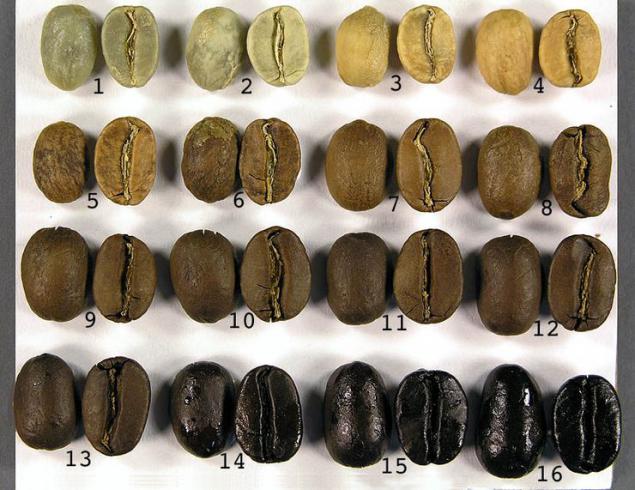
Then the grain is unloaded into the "mixer-cooler." Mixer cold air blower pressure, and thus stops the roasting process. By the way, if you think that the roaster shop smells of coffee, you are wrong. It smells like there is so-so. If you are toasted seeds in a skillet, then that's about the same.
Roasting coffee is not only opens the pores and releases valuable consumer-flavors, but also in the literal sense podpekaet grain. So drink and meets the beloved taste yummy baked, such as cake or pechenyuh. However, the lighter roasted coffee, the weaker the roasted flavor. It is very noticeable in comparison. Imagine bread - white, wheat or black Darnitskiy. He Baked dark crust and a soft sweet slight body. So the taste of coffee varies in the range of bodies to the crust, and roast will determine the balance of acidity, bitterness in the taste of the drink. The darker roasted coffee, the more "coal" zhzhёnyh sugars, the more bitter. The lighter, purer, acidity and pronounced character and flavors. It's a matter of taste. But then again, if you do not "uncover" the grain, not dozharite it - you would not be bread and dough. Underdone coffee has bright acidity and juicy green grass, it is also poorly defined due to the fact that the coffee does not give himself more fully.
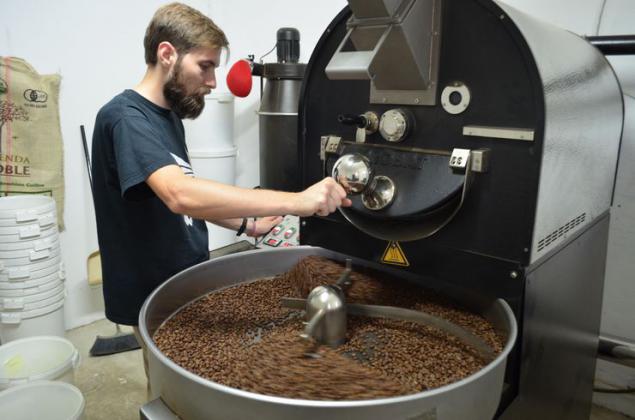
So we fry coffee. I opened it. Now I have to accept the fact that close it no way back. This process is irreversible. No vacuum bags will not save seed from the loss of their precious fragrances. Of course, the coffee after roasting sealed pack to reduce the amount of air in contact with the grain. Within a day or two, coffee continues to allocate gas. To gas output, packages are special valves. The actual shelf life of coffee - one month after roasting. Although I do not drink coffee more than three weeks. Ground coffee, by the way, not only discloses roasting, but the grinder. He loses his dignity much faster. So smalyvat coffee needed only before cooking. The most common grinder - it's better than buying pre-ground coffee.
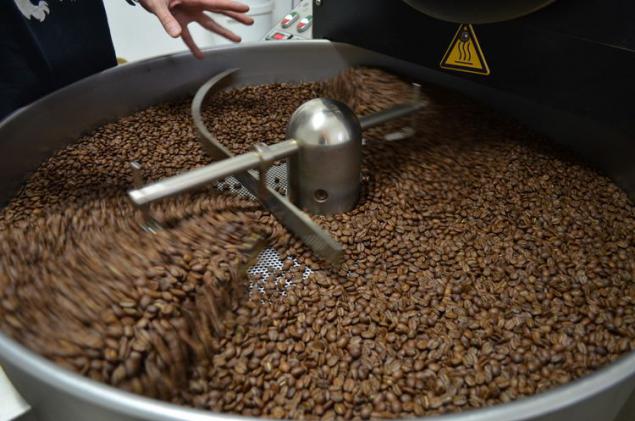
Source:
We roast coffee.
You may be interested in reading about it, and I asked our roasters Kohl for you to write a post. The picture roster - a special stove for roasting coffee beans.
10 Photo © Daniilskiy

Green beans are very similar to Dried peas in banks. In all Soviet kitchens lying peas. He was kept in such podrzhavyh cans with characteristic curved cover, which is not immediately closed. Peas very, very hard, even foot not rastopchesh. And the smell had a distinctive, memorable. So say people who see green coffee for the first time: peas smell.

However, inquisitive nose detects a good coffee and other flavors. Sometimes rotten apples or yeast dough - is of the unexpected. And the average "prostokofe" smells really green peas. Yet it's beans.
Green coffee - coffee berry seed is extracted from numerous organic diapers: peel, pulp, parchment. Imagine a plum, which very little flesh, and it is very hard attached to the seed.
The peel is removed from the berries is quite simple. Press the fingers, she easily slips from the body of the berries. But to separate the bone from the pulp is very hard. More precisely, in principle, it is not difficult, if you spend one minute berry berries 3. But if a million, it's a difficult task, and it is engaged in the whole manufacturing industry. Quality and scruples processing in turn will greatly affect not only the taste, but also on the price of the product.

So the separation of grain, usually consisting of two halves and a coffee bean processing. There is an incredible amount of its subtleties, pens and fishechek.
Negros sorted coffee berry

Once the coffee is collected and processed it should fry. Why roast coffee? In itself, the grain is very concentrated and strong. It is with great reluctance, and gives itself dissolves in water. So we need to weaken the ties inside the grain to the volatile aromatics started to go unchecked. We burn, thus weakening, most of these communications. And then the grain begins to reveal its pores are formed in cavitation, grain swells (increasing in volume almost doubled), bonds weaken and natural grain spirit begins to stand out strongly.
Grain can be compared with the long stored at the bottom of the box with a rubber ball. If it is not fully inflated, it will be wrinkled when it is inflated well, the surface becomes smooth.

Let us turn to the most, in my opinion, interesting.
Generally coffee fry in a skillet in a small home roster, at the stake or laser pepyakoy from the future. Charlie would fry his eyes, but it is better suited for this special professional roasters.
Roster - a carefully thought-through, tested at the stands, stuffed engineer genius, very expensive, and for each individual roasters thing. He's a big, powerful, fire. But it's made for one purpose - to roast coffee. Uniformity, stability and usability are distinguished one from another roster. There are many manufacturers, but the best do in Germany and the USA: Probat, Giesen, Diedrich - the big three.

Just specify the roster - a machine, but sometimes "Roster" refers to the profession of this same unit. I, not to be confused, call the profession in Russian: roasters.
So even the most modern and futuristic car you need to drive, the plane still planted by hand and the other is not quite correct analogy. The process of roasting, anyway, will require human presence. Only a person determines the style and the stability of frying. Of course you can put the program and fry, relying on electronic brain roster (if it is), but it's cool if you drink this coffee will also be electronic consumers.
Profile roasting, for example:

Briefly describe the process.
We stock kept green coffee. In a room with a predetermined humidity and temperature. Before frying, we warm up a roster so that uniformly warmed up (and expanded) bearings and moving parts. Roster is heated to a temperature of 235 C for 40-50 minutes (usually enough). Roster runs on natural gas. There are low-end models, run on electricity, but to achieve the desired effect in them is impossible. They are very inert.
Green coffee is poured into a drum roaster after reaching the temperature required for download. This usually 215-225 degrees Celsius. This temperature is determined empirically and depends on the style of roasting. The first 3-4 minutes of the process of drying the grain. From the coffee begins to evaporate the moisture. Roaster operates at peak power, the temperature sensor 89c falls to, and then slowly increase the dynamics of 15-17 C per minute. At some point in the 5-6 minute grain goes in the "yellow stage." Grains turn yellow, purchasing straw color. Most of the moisture evaporated, and begins to roast coffee. At this point, the temperature dynamics - 8-10S minute.
For 8-10 minutes comes the moment the so-called "first of crack." Gases and steam coming out of corn bursting with grain and it cracks, releasing the remains of a couple and begins to roast thoroughly even stronger. The temperature depends on the grain of crack, but hovering around 198-205S. Then coffee "dozharivaetsya" in the desired color with a given dynamics. Quickly it can be longer, depending on the style of roasting.

Then the grain is unloaded into the "mixer-cooler." Mixer cold air blower pressure, and thus stops the roasting process. By the way, if you think that the roaster shop smells of coffee, you are wrong. It smells like there is so-so. If you are toasted seeds in a skillet, then that's about the same.
Roasting coffee is not only opens the pores and releases valuable consumer-flavors, but also in the literal sense podpekaet grain. So drink and meets the beloved taste yummy baked, such as cake or pechenyuh. However, the lighter roasted coffee, the weaker the roasted flavor. It is very noticeable in comparison. Imagine bread - white, wheat or black Darnitskiy. He Baked dark crust and a soft sweet slight body. So the taste of coffee varies in the range of bodies to the crust, and roast will determine the balance of acidity, bitterness in the taste of the drink. The darker roasted coffee, the more "coal" zhzhёnyh sugars, the more bitter. The lighter, purer, acidity and pronounced character and flavors. It's a matter of taste. But then again, if you do not "uncover" the grain, not dozharite it - you would not be bread and dough. Underdone coffee has bright acidity and juicy green grass, it is also poorly defined due to the fact that the coffee does not give himself more fully.

So we fry coffee. I opened it. Now I have to accept the fact that close it no way back. This process is irreversible. No vacuum bags will not save seed from the loss of their precious fragrances. Of course, the coffee after roasting sealed pack to reduce the amount of air in contact with the grain. Within a day or two, coffee continues to allocate gas. To gas output, packages are special valves. The actual shelf life of coffee - one month after roasting. Although I do not drink coffee more than three weeks. Ground coffee, by the way, not only discloses roasting, but the grinder. He loses his dignity much faster. So smalyvat coffee needed only before cooking. The most common grinder - it's better than buying pre-ground coffee.

Source:
